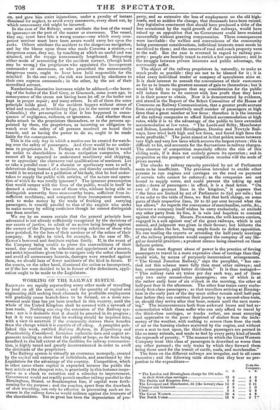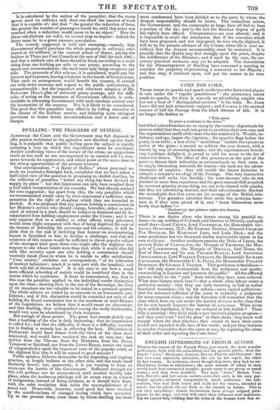WORKING OF THE RAILWAY SYSTEM.
RAILWAYS are rapidly superseding every other mode of travelling by land on all the main roads and the quantity of capital and engineering skill seeking fresh channels for profitable employment will gradually cause branch-lines to be formed, on a more eco- nomical scale than has yet been reached in this country, until the whole of the United Kingdom shall be covered with a network of iron roads. Nothing can stop the extension of the Railway sys- tem: nor is it desirable that it should be arrested in its progress ; but it is very necessary that its working should be inquired into, with a view to ascertain if the community derives those benefits from the change which it is capable of aff.rding. A pamphlet pub- lished this week, entitled Railway Reform, its Expediency and Practicability Considered, furnishes authentic data and cogent ar- guments tending to show that the public at large, so far from being benefited to the full extent of the facilities for railway communica- tion, is highly taxed and greatly inconvenienced in order to swell the dividends of the proprietors. The Railway system is virtually an enormous monopoly, created by the capital and enterprise of individuals, and sanctioned by the Legislature for the advantage of the country. Competition, which in other cases where capital is expended secures the public the best article at the cheapest rate, is practically in this instance inope- rative as a check to extortion and a stimulus to improvement. Government would not readily permit another railway parallel to the Birmingham, Bristol, or Southampton line, if capital were forth- coming for the purpose ; and the coaches, apart from the drawback of slow travelling, can only be effective in preventing such an in- crease in the railway fares as would militate against the interests of the shareholders. Yet so great has been the depreciation of pro-
perty, and so extensive the loss of employment on the old high- roads, and so sudden the change, that thousands have been ruined. Any legislative enactment that should have produced a tithe of the loss occasioned by the rapid growth of the railways, would have raised up an opposition that no Government could have resisted successfully without granting compensation. These consequences were inevitable : the welfare and convenience of the community being paramount considerations, individual interests must needs be sacrificed to them ; and the owners of road and coach property went to the wall. But the case is reversed in regard to railway pro- perty: people are heavily taxed to enrich a few speculators ; and in the struggle between private interests and public advantage, the community suffer.
The object of the railway proprietors is, naturally, to make as much profit as possible : they are not to be blamed for it ; it is what every individual trader or company of speculators aims at. It is their interest to consult the convenience of their customers so far as to insure the greatest amount of gain to themselves ; but it would be folly to suppose that any consideration for the public will induce them to be content with less profit than they have it in their power to obtain. Now it is demonstrated by evidence, and stated in the Report of the Select Committee of the House of Commons on Railway Communication, that a greater profit accrues from carrying a comparatively small number of passengers at high fares than a great number at low fares : therefore it is the interest of the railway companies to afford limited accommodation at high rates, while it is to the advantage of the public to have extended accommodation at low rates. "The Leeds and Selby, Manchester and Bolton, London and Birmingham, Dundee and Newtvle Rail- ways, have tried both high and low fares, and found high faresthe more profitable." The point aimed at is that goldeq mean between very high and very low fares which secures the largest return : this is difficult to hit, and accounts for the fluctuations in railway charges. The absence of competition materially affects the rise of this sliding scale, if it does not entirely govern its operation ; and in proportion as the prospect of competition recedes will the scale of prices ascend.
The checks to railway rapacity provided by act of Parliament seem to be insufficient. The provision intended to enable other persons to run engines and carriages on the road on payment of certain tolls cannot be enforced; as the companies are not bound to supply water, and could prevent the taking up and settin ; down of passengers : in effect, it is a dead letter. "On two of the greatest lines in the kingdom," it appears that " the fares are limited by act of Parliament to 3id. per mile ; but if we refer to the table of fares, we find that both charge, on some parts of their respective lines, 20 to 25 per cent beyond what the law allows." As regards the conveyance of merchandise, cattle, &c., wherever a company itself wishes to carry exclusively, or exclude any other party from its line, it is vain and hopeless to contend against the company. Messrs. PICKFORD, the well-known carriers, engaged in a sun against one; of the great railways, which is not named, and judgment was given in their favour; but hitherto the company defies the law, having ample funds to defeat opposition. No one reading the reports or attending the half-yearly meetings of the railway proprietors would suspect the company of any ille- gal or doubtful practices ; a prudent silence being observed on these delicate points.
But the most flagrant abuse of power is the practice of forcing passengers to travel in a more expensive class of carriage than they would wish, by means of purposely inconvenient arrangements. "The Grand Junction Railway," says the pamphlet, "has car- ried out this scheme more fully than most other railways; and has, consequently, paid better dividends." It is thus managed- " This railway runs six trains per day each way, and of these only two carry second-class passengers; one of which is at the rather early hour of six o'clock in the morning, the other at half-past four in the afternoon. The other four trains carry exclu-
sively first-class passengers ; so that travellers arriving at Birming- ham in the early part of the day must either remain until half-past four before they can continue their journey by a second-class train, or, should they arrive after that hour, remain until the next morn- ing." The inconveniences both from awkward hours and bad ac- commodation which those suffer who can only afford to travel by the third-class carriages, or trucks rather, are most annoying and oppressive to the poor : deprived of shelter from the incle- mency of the weather, with nothing to screen them from the rush
of air or the burning cinders scattered by the engine, and without even a seat to rest upon, the third-class passengers are penned in like so many animals, and made to feel by every petty kind of insult the reproach of poverty. " The manner in which the Great Western Company treat this class of passengers is described as worse than any other pursued ; the only trains by which they forward them being those used for the transit of cattle, coals, and merchandise."
The fares on the different railways are irregular, and in all cases excessive ; and the following table shows that they bear no pro- portion to the expenditure-
"The London and Birmingham charge for 100 miles
in their third-class carriages 12 8 4 2 The Dublin and Kingston ditto 5 6 2 8 The Liverpool and Manchester, 2d (the lowest) class 14 9 6 11 Glasgow and Greenock 2 3 1 0 Ulster 5 4 2 9
The Great Western 10
4 4 8
The North Union 18
6
' 5
7"
Crsts the Company.
s. d. s. d.
It is calculated by the author of the pamphlet, that the steam power used on railways only does one-third the amount of work that it is capable of; and that " the greater the reduction of fares, the greater the number of passengers would be, until that point was reached when a reduction would cease to be an object." How far these calculations are valid, we cannot stop to inquire : indeed the latter must be in a great measure speculative.
The remedy suggested is bold and sweeping,—namely, that Government should purchase the whole property in railways, esti- mated at 63 millions; at the current prices of shares, paying the holders in Three per Cent Consols at the rate of 106/. for each 1001.; and that a uniform rate of fares should be fixed, according to a scale rising from one farthing per mile to one penny, according to the speed and accommodation ; the mail-train only being twopence per mile. The proceeds of this scheme, it is calculated, would pay the interest and expenses, leavings balance in the hands of Government. That such an arrangement would benefit the country, if carried out with strict economy and regard to the public convenience, is unquestionable : but the imperfect and reluctant adoption of Mr. llowLerin HILL'S plan of universal penny postage, and the diffi- culty of acting on the inertness of Government officials, is unfa- vourable to intrusting Government with such absolute control over the locomotion of the country. Nor is it likely to be considered. The good that this pamphlet may effect is by calling attention to the abuses of the Railway system, and inducing more stringent provisions to insure better accommodation and a lower rate of charges.



























 Previous page
Previous page